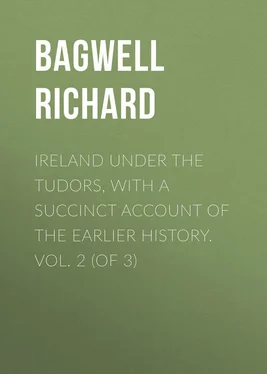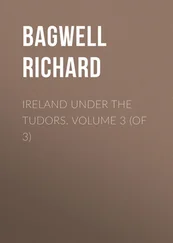Richard Bagwell - Ireland under the Tudors, with a Succinct Account of the Earlier History. Vol. 2 (of 3)
Здесь есть возможность читать онлайн «Richard Bagwell - Ireland under the Tudors, with a Succinct Account of the Earlier History. Vol. 2 (of 3)» — ознакомительный отрывок электронной книги совершенно бесплатно, а после прочтения отрывка купить полную версию. В некоторых случаях можно слушать аудио, скачать через торрент в формате fb2 и присутствует краткое содержание. Жанр: foreign_antique, foreign_prose, Историческая проза, на английском языке. Описание произведения, (предисловие) а так же отзывы посетителей доступны на портале библиотеки ЛибКат.
- Название:Ireland under the Tudors, with a Succinct Account of the Earlier History. Vol. 2 (of 3)
- Автор:
- Жанр:
- Год:неизвестен
- ISBN:нет данных
- Рейтинг книги:4 / 5. Голосов: 1
-
Избранное:Добавить в избранное
- Отзывы:
-
Ваша оценка:
- 80
- 1
- 2
- 3
- 4
- 5
Ireland under the Tudors, with a Succinct Account of the Earlier History. Vol. 2 (of 3): краткое содержание, описание и аннотация
Предлагаем к чтению аннотацию, описание, краткое содержание или предисловие (зависит от того, что написал сам автор книги «Ireland under the Tudors, with a Succinct Account of the Earlier History. Vol. 2 (of 3)»). Если вы не нашли необходимую информацию о книге — напишите в комментариях, мы постараемся отыскать её.
Ireland under the Tudors, with a Succinct Account of the Earlier History. Vol. 2 (of 3) — читать онлайн ознакомительный отрывок
Ниже представлен текст книги, разбитый по страницам. Система сохранения места последней прочитанной страницы, позволяет с удобством читать онлайн бесплатно книгу «Ireland under the Tudors, with a Succinct Account of the Earlier History. Vol. 2 (of 3)», без необходимости каждый раз заново искать на чём Вы остановились. Поставьте закладку, и сможете в любой момент перейти на страницу, на которой закончили чтение.
Интервал:
Закладка:
Sussex struggled hard to avoid returning to the hated Irish service, and pleaded occupations public and private. He declared, with perfect truth, that Sidney would govern Ireland much better than he could, and he was doubtless unwilling to leave the field clear to Lord Robert Dudley. But the Queen would take no denial, and he had to go. She was at this time inclined to govern Ireland in her father’s cheap and rather otiose fashion, and the number of pardons granted during her first years shows that she aimed at a reputation for clemency. She understood the magnitude of the task awaiting her in Ireland, but declared herself unable to spare the necessary forces on account of the huge debt bequeathed by her sister, and of the expensive legacy of a Scotch and French war. The exchequer of Ireland had been much mismanaged, and its reform was urged on the restored governor, whose standing army was fixed at 1,500 men, 300 of them horse and 300 kerne. He was authorised to spend 1,500 l. a month, but urged, if possible, to reduce the expense to 1,000 l. The amount either of men or money was not to be exceeded, except under the pressure of necessity. The first duty of the new Lord Deputy and his council was to set the service of God before their eyes, and, pending a Parliamentary inquiry, all English-born officials were, at least in their own houses, to use the rites and ceremonies established in England. 5 5 Instructions to Sussex, 1559, in Carew, pp. 279 and 284.
Sussex landed at or near Dalkey, and on the following day rode into Dublin. He was received on St. Stephen’s Green by the Mayor and Aldermen. Shaking hands with the chief magistrate, the Earl is reported to have said, ‘You be all happy, my masters, in a gracious queen.’ Three days later he was sworn in at Christ Church, Nicholas Darton, or Dardy, one of the vicars-choral, chanting the Litany in English before the ceremony, and the choir singing the Te Deum in English afterwards. Ormonde at the same time took the oath as a Privy Councillor and as Lord Treasurer of Ireland. Thus was the Protestant ritual quietly re-introduced, Sidney having been sworn with the full Roman ceremonial. The work of painting the two cathedrals, and of substituting texts of Scripture for ‘pictures and popish fancies,’ had begun three months before. 6 6 Mant from Loftus MS.; Ware’s Annals .
Many important men had hastened to offer their services and forward their petitions to the new Queen. Conspicuous among them was Richard, second Earl of Clanricarde, called Sassanagh , or the Englishman, of whose loyalty the Queen had a very good opinion, but who in one important respect fell short even of a Court standard of morals. The names of seven of his wives and sultanas have come down to us, and of these at least five were living at this time. He was acknowledged as captain of Connaught, his Earldom was confirmed by patent, and he received other marks of favour. The Queen also lent a favourable ear to Ormonde’s uncle, brother, and cousin, and to the new Earl of Desmond. Connor O’Brien, whom Sussex had established in the Earldom of Thomond, and MacCarthy More, were also well treated, and so were several of the corporate towns. 7 7 Memorial of answers by the Queen, July 16, 1559, and Instructions to Sussex, July 17, both in Carew ; note of the Earl of Clanricarde’s wives and concubines now alive, Feb. 1559 (No. 18).
The first Parliament of Elizabeth met on January 12, 1560, and was dissolved on February 1. It was attended by three archbishops, seventeen bishops, and twenty-three temporal peers, including all the earls then extant in Ireland. Ten counties sent two knights each, and twenty-eight cities and boroughs were represented by two burgesses each. Ten other counties, King’s and Queen’s among them, are mentioned, Connaught counting as one, and Down being divided into two; but they either received no writs or made no returns, and the same may be said of the borough of Kilmallock. James Stanihurst, Recorder of Dublin and member for that city, was chosen speaker. The chief business was to establish the Queen’s title, and to restore her father’s and brother’s ecclesiastical legislation. First-fruits were restored to the Crown, and so was the commandery of St. John. Massingberd’s alienations were annulled, and, as he was suspected of secret dealings with the Irish, he was attainted unless he should surrender within forty days.
So far English legislation was closely followed, but in two important respects the Church was made more dependent on the State than in England. Royal Commissioners, or Parliament in the last resort, were to be the judges of heresy without reference to any synod or convocation, and congés d’élire were abolished as useless and derogatory to the prerogative. These matters having been arranged to his satisfaction, Sussex again went to England, and Sir William Fitzwilliam, who had just come over as Treasurer at War, was appointed Lord Justice in his room. 8 8 The list of this Parliament is in Tracts relating to Ireland , vol. ii., Appendix 2; Printed Statutes , 2 Elizabeth; Collier , vol. vi. p. 296 (ed. 1846); Ware’s Annals ; Leland , book iv. chap. i.
Fitzwilliam, who was new to Ireland, at first found the Irish pretty peaceful, but admitted that the overtaxed people of the Pale were less so than they were bound in duty to be. Causes of disturbance were not long in coming. Old O’Connor escaped from Dublin Castle, and uneasiness was immediately observable in the districts where he had influence. Calvagh O’Donnell’s wife, who was Argyle’s half-sister, had brought over some 1,500 Scots, ‘not to her husband’s enrichment,’ as the Lord Justice supposed, but as a plague to Shane, who had married O’Donnell’s sister and ill-treated her. Shane had engaged a similar force, and all these combustibles could scarcely be stored without mischief. The priests who were beaten in England showed signs of an intention to transfer the struggle to Ireland, where they had many partisans and might create more. At all events, they were flocking across the Channel, ‘not for any great learning the universities of Ireland shall show them as I guess.’ The Government only was weak. There were but fifty hundredweight of lead in store, and Fitzwilliam thought he might have to strip the material for bullets from some house or church. 9 9 Fitzwilliam to Sussex, March 8 and 15, 1560.
Kildare, whose foreign education and connection made him more dangerous than any of his ancestors had been, was undoubtedly playing with edged tools. Desmond refused to pay cess. The two earls had met at Limerick, and would certainly join Donnell O’Brien if he landed with the expected foreign aid. There were rumours of French ships on the coast, and frequent messengers passed between Kildare, Desmond, and Shane O’Neill. Edmond Boy, a Geraldine who was usually employed on this dangerous service, warned a relation who had married an Englishman to sell all and fly the realm, for if all promises were kept, her husband would never reap that he had sown. Kildare not only kept his followers under arms, but declared that he and his friends would be slaves no longer, presided at assemblies of Irishmen, and ostentatiously heard mass in public. Of all this there was ample evidence, and in addition, Lady Tyrone had sought interviews with the Lord Justice, and sworn the interpreter to secrecy. Laying the Bible first on her own head and then on his, ‘which is the surest kind of oath taken with them,’ she made a very positive statement as to the alliance of her son Shane and the two Geraldine earls. The Countess indeed, Fitzwilliam told Cecil, was ‘something busy-headed and largely-tongued, crafty and very malicious, no great heed to be given to her, unless some other thing might lend credit to the tale she telleth, as in this there is.’ There was quite enough to cause anxiety, and the Government were almost defenceless. ‘Send us over men,’ the Lord Justice cried, ‘that we may fight ere we die.’ 10 10 Fitzwilliam to Cecil, April 11, 1560; Advertisements out of Ireland, May (No. 15), and many other papers about this time.
Интервал:
Закладка:
Похожие книги на «Ireland under the Tudors, with a Succinct Account of the Earlier History. Vol. 2 (of 3)»
Представляем Вашему вниманию похожие книги на «Ireland under the Tudors, with a Succinct Account of the Earlier History. Vol. 2 (of 3)» списком для выбора. Мы отобрали схожую по названию и смыслу литературу в надежде предоставить читателям больше вариантов отыскать новые, интересные, ещё непрочитанные произведения.
Обсуждение, отзывы о книге «Ireland under the Tudors, with a Succinct Account of the Earlier History. Vol. 2 (of 3)» и просто собственные мнения читателей. Оставьте ваши комментарии, напишите, что Вы думаете о произведении, его смысле или главных героях. Укажите что конкретно понравилось, а что нет, и почему Вы так считаете.












